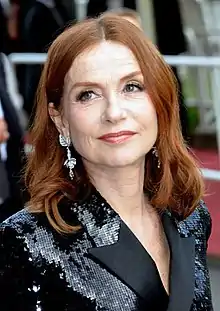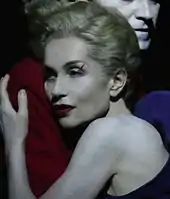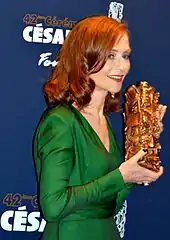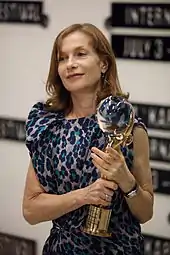Isabelle Huppert
Isabelle Anne Madeleine Huppert (French: [izabɛl ypɛʁ]; born 16 March 1953) is a French actress. Described as "one of the best actresses in the world",[1][2] she is known for her portrayals of cold and disdainful characters devoid of morality.[3] The recipient of several accolades, including two César Awards, five Lumières Awards, a BAFTA Award, three Cannes Film Festival honors, a Golden Globe Award, and an Academy Award nomination; in 2020, The New York Times ranked her second on its list of the greatest actors of the 21st century.[4]
Isabelle Huppert | |
|---|---|
 Huppert at the 2018 Cannes Film Festival | |
| Born | Isabelle Anne Madeleine Huppert 16 March 1953 Paris, France |
| Alma mater | Conservatoire à rayonnement régional de Versailles Institut national des langues et civilisations orientales (INALCO) Conservatoire national supérieur d'art dramatique (CNSAD) |
| Occupation | Actress |
| Years active | 1971–present |
| Works | Performances |
| Partner | Ronald Chammah (1982–present) |
| Children | 3, including Lolita Chammah |
| Relatives | Caroline Huppert (sister) |
| Awards | Full list |
Huppert's first César nomination was for the 1975 film Aloïse. In 1978, she won the BAFTA Award for Most Promising Newcomer for The Lacemaker. She went on to win two Best Actress awards at the Cannes Film Festival, for Violette Nozière (1978) and The Piano Teacher (2001), as well as two Volpi Cups for Best Actress at the Venice Film Festival, for Story of Women (1988) and La Cérémonie. Her other films in France include Loulou (1980), La Séparation (1994), 8 Women (2002), Gabrielle (2005), Amour (2012), Things to Come (2016), and Happy End (2017).
Huppert is among international film's most prolific actresses, having worked in Italy, Russia, Central Europe, and in Asia. Her English-language films include Heaven's Gate (1980), The Bedroom Window (1987), I Heart Huckabees (2004), The Disappearance of Eleanor Rigby (2013), Louder Than Bombs (2015), Greta (2018), Frankie (2019), and Mrs. Harris Goes to Paris (2022).
In 2016, Huppert garnered international acclaim for her performance in Elle, which earned her a Golden Globe Award, an Independent Spirit Award and a nomination for the Academy Award for Best Actress. She also won Best Actress awards from the National Society of Film Critics, New York Film Critics Circle and the Los Angeles Film Critics Association, for both Elle and Things to Come.
Also a prolific stage actress, Huppert is the most nominated actress for the Molière Award, with eight nominations and an honorary award in 2017. She made her London stage debut in the title role of the play Mary Stuart in 1996, and her New York stage debut in a 2005 production of 4.48 Psychosis. She returned to the New York stage in 2009 to perform in Heiner Müller's Quartett, and in 2014 to star in a Sydney Theatre Company production of The Maids. In 2019, Huppert starred in Florian Zeller's The Mother at the Atlantic Theater Company in New York.
Early life and career
Huppert was born on 16 March 1953,[lower-alpha 1] in the 16th arrondissement of Paris, the daughter of Annick (née Beau; 1914–1990), an English language teacher, and Raymond Huppert (1914–2003), a safe manufacturer. The youngest child, she has a brother and three sisters, including filmmaker Caroline Huppert. She was raised in Ville-d'Avray.[6] Her father was Jewish;[7][8][9] his family was from Eperjes, Austria-Hungary (now Prešov) and Alsace-Lorraine.[10][11] Huppert was raised in her mother's Catholic faith.[12][13] On her mother's side, she is a great-granddaughter of one of the Callot Soeurs.[14]
Huppert was encouraged by her mother to begin acting at a young age, and became a teenage star in Paris. She later attended Conservatoire à rayonnement régional de Versailles, where she won a prize for her acting. She is also an alumna of the Conservatoire national supérieur d'art dramatique (CNSAD).[15]
Huppert made her television debut in 1971 with Le Prussien, and her film debut in 1972's Faustine et le Bel Été. Her later appearance in the controversial Les Valseuses (1974) made her increasingly recognized by the public. Her international breakthrough came with La Dentelliere (1977),[16] for which she won a BAFTA award for Most Promising Newcomer to Leading Film Roles. She made her American film debut in Michael Cimino's Heaven's Gate (1980), which opened to poor reviews and was a box office failure; decades later, the film has been reassessed, with some critics considering it an overlooked masterpiece.[17] Throughout the 1980s, Huppert continued to explore enigmatic and emotionally distant characters, most notably in Maurice Pialat's Loulou (1980), Godard's Sauve qui peut (la vie) (1980), Diane Kurys' Coup de foudre (1983), and Claude Chabrol's Une Affaire de Femmes (1988).
Later career and recent credits

In 1994, Huppert collaborated with American director Hal Hartley on Amateur, one of her few English-language performances since Heaven's Gate. She portrayed a manic and homicidal post-office worker in Claude Chabrol's La Cérémonie (1995), with Sandrine Bonnaire, and continued her cinematic relationship with Chabrol in Rien ne va plus (1997), and Merci pour le Chocolat (2000). She also appeared in Michael Haneke's The Piano Teacher (2001), which is based on a novel of the same name (Die Klavierspielerin) by Austrian author and winner of the Nobel Prize in Literature in 2004, Elfriede Jelinek. In this film, she played a piano teacher named Erika Kohut, who becomes involved with a young pianist and ladies' man, Walter Klemmer. Regarded as one of her most impressive turns, her performance netted the 2001 Best Actress prize in Cannes.
In 2004, she starred in Christophe Honoré's Ma Mère as Hélène with Louis Garrel. Here, Huppert plays an attractive middle-aged mother who has an incestuous relationship with her teenage son. Ma Mère was based on a novel by Georges Bataille. 2004 also saw her star opposite Dustin Hoffman in David O. Russell's I Heart Huckabees.
Huppert has worked in several countries since her debut. She worked in Italy (with directors Paolo and Vittorio Taviani, Mauro Bolognini, Marco Ferreri and Marco Bellocchio), in Russia (with Igor Minaiev), in Central Europe (with Werner Schroeter, Andrzej Wajda, Ursula Meier, Michael Haneke, Márta Mészáros and Aleksandar Petrović) and in Asia (with Hong Sang-soo, Brillante Mendoza and Rithy Panh).
Huppert is also an acclaimed stage actress, receiving seven Molière Award nominations, including for the titular role in a 2001 Paris production of Medea, directed by Jacques Lassalle,[18] and in 2005, at the Odéon-Théâtre de l'Europe in Paris, in the title role of Ibsen's Hedda Gabler.[19] Later that year, she toured the United States in a Royal Court Theatre production of Sarah Kane's theatrical piece 4.48 Psychosis. This production was directed by Claude Régy and performed in French.[20] Huppert returned to the New York stage in 2009 to perform in Heiner Müller's Quartett.[21]
Huppert was the President of the Jury at the 62nd Cannes Film Festival, in May 2009.[22] She had been s Member of the Jury and Master of Ceremony in previous years, as well as winning the Best Actress Award twice. As president, she and her jury awarded the Palme d'Or to The White Ribbon by the Austrian director Michael Haneke,[23] who has directed her in The Piano Teacher and Time of the Wolf.[24]

Huppert starred in the 11th-season finale of Law & Order: Special Victims Unit which aired on 19 May 2010.
In September 2010, the Philippine Daily Inquirer announced that she had been cast in the film Captive by Filipino director Brillante Mendoza. Huppert played one of the hostages of the Dos Palmas kidnappings.[25]
In 2012, she starred in two films that competed for the Palme d'Or at the 2012 Cannes Film Festival: Michael Haneke's Amour and Hong Sang-soo's In Another Country, with the former winning the top prize.[26][27]
In 2013, she co-starred in Sydney Theatre Company's The Maids by Jean Genet, with Cate Blanchett and Elizabeth Debicki and directed by Benedict Andrews in a new English translation by Andrews and Andrew Upton. In August 2014, the production toured in New York as a part of the Lincoln Center Festival.[28][29]
In 2016, she starred in two films that received widespread critical acclaim: Mia Hansen-Løve's Things to Come, which premiered at the Berlinale, and Paul Verhoeven's Elle, which premiered at Cannes. Among other awards and nominations, she won the National Society of Film Critics Award for Best Actress, New York Film Critics Circle Award for Best Actress and the Los Angeles Film Critics Association Award for Best Actress for both films.[30] For her performance in Elle, Huppert won several awards, including the Golden Globe Award, César Award for Best Actress, Gotham Independent Film Award for Best Actress, and the Independent Spirit Award. In addition, she was nominated for the Academy Award for Best Actress and the Critics' Choice Movie Award for Best Actress.
In 2016, Huppert starred in Krzysztof Warlikowski's stage production of Phèdre(s), which toured Europe as well as BAM in New York.[31]
Personal life
Huppert has been in a relationship with writer, producer and director Ronald Chammah since 1982.[32] They have three children, including the actress Lolita Chammah, with whom she acted in five films, including Copacabana (2010) and Barrage (2017).[33][34]
Huppert is the owner of the repertory cinemas Christine Cinema Club and Ecoles Cinema Club in Paris, which her son Lorenzo curates.[35][36]
Filmography
Awards and nominations

Huppert has been nominated 16 times, becoming the most nominated actress in the history of César Awards, winning Best Actress twice: in 1996 for her work in La Cérémonie (1995), and in 2017 for her role in Elle (2016).[37]
She is one of only four women who have twice won Best Actress at the Cannes Film Festival: in 1978 for her role in Violette Nozière by Claude Chabrol (tied with Jill Clayburgh) and in 2001 for The Piano Teacher by Michael Haneke.[38]
She is also one of only four women who have twice received the Volpi Cup for Best Actress at the Venice Film Festival: in 1988 for her part in Une affaire de femmes (tied with Shirley MacLaine), and in 1995 for La Cérémonie (tied with her partner in the movie, Sandrine Bonnaire).[39] Both films were directed by Claude Chabrol. Additionally, she received a Special Lion in 2005 for her role in Gabrielle.[40]
Huppert was twice voted Best Actress at the European Film Awards: in 2001 for playing Erika Kohut in The Piano Teacher, and in 2002 with the entire cast of 8 Women (directed by François Ozon).[22] The latter cast also won a Silver Bear for Outstanding Artistic Contribution, at the 2002 Berlin International Film Festival.[41]
Huppert won the Golden Globe Award for Best Actress in a Motion Picture – Drama[42] and received her first nomination for the Academy Award for Best Actress for her work in Elle.[43]
In 2008, she received the Stanislavsky Award for outstanding achievement in acting, and devotion to the principles of the Stanislavski's system.[44]
She was made Chevalier (Knight) of the Ordre national du Mérite on 8 December 1994[45] and was promoted to Officier (Officer) in 2005.[45]
She was made Chevalier (Knight) of the Légion d'honneur on 29 September 1999[46] and was promoted to Officier (Officer) in 2009.[46]
She was selected for Honorary Golden Bear Lifetime Achievement Award at 72nd Berlin International Film Festival awarded on 15 February 2022 in festival award ceremony at Berlinale Palást.[47]
Legacy
Huppert holds the record for being the actress with the most films entered in the official competition of the Cannes Film Festival.[48] As of 2022, she has had 22 films in the main competition and a total of 29 films screened at the festival.[49] Huppert's frequent Cannes' appearances have led her to be dubbed "the queen of Cannes" by journalists.[50][51][52][53]
David Thomson on Claude Chabrol's Madame Bovary: "[Huppert] has to rate as one of the most accomplished actresses in the world today, even if she seems short of the passion or agony of her contemporary, Isabelle Adjani." Stuart Jeffries of The Observer on The Piano Teacher: "This is surely one of the greatest performances of Huppert's already illustrious acting career, though it is one that is very hard to watch." Director, Michael Haneke: "[Huppert] has such professionalism, the way she is able to represent suffering. At one end you have the extreme of her suffering and then you have her icy intellectualism. No other actor can combine the two."[5] Of her performance in 2007's Hidden Love, Roger Ebert said "Isabelle Huppert makes one good film after another.... she is fearless. Directors often depend on her gift for conveying depression, compulsion, egotism and despair. She can be funny and charming, but then so can a lot of actors. She is in complete command of a face that regards the void with blankness."[54] In 2010, S.T. VanAirsdale described her as "arguably the world's greatest screen actress."[55]
Huppert's work in Elle and Things to Come topped The Playlist's ranking of "The 25 Best Performances Of 2016", stating: "She runs the emotional gamut from one film to the next, carnal, savage, shattered, listless, invulnerable but exposed, a woman on the verge of collapse who refuses to succumb to her instabilities. Huppert's career spans four decades and change, plus a heap of awards and accolades, but with Elle and Things To Come, she could well be having her best year yet."[56]
See also
- List of actors nominated for Academy Awards for foreign language performances
- List of French Academy Award winners and nominees
Notes
References
- "Isabelle Huppert, Probably World's Greatest Actress, Reveals Where She Does Her Worst Acting". W Magazine | Women's Fashion & Celebrity News. Retrieved 13 March 2020.
- Ehrlich, David (5 December 2016). "Who Is the Greatest Actress In the World? — IndieWire Critics Survey". IndieWire. Retrieved 13 March 2020.
- "Isabelle Huppert (english version)". Alliance Francaise Melbourne. Retrieved 13 March 2020.
- Dargis, Manohla; Scott, A.O. (25 November 2020). "The 25 Greatest Actors of the 21st Century (So Far)". The New York Times. Retrieved 28 November 2020.
- Jeffries, Stuart (28 October 2001). "Just don't ask her to play cute". The Guardian. The Observer.
- Chalmers, Robert (3 July 2010). "Isabelle Huppert: 'I don't have a reputation for being difficult'". The Independent. Retrieved 17 July 2017.
- Leigh, Danny (23 February 2017). "Isabelle Huppert: 'Men aren't afraid of women the way women are afraid of men'". The Guardian. Retrieved 20 May 2018.
- "The face of fearless cinema: French actress Isabelle Huppert at 65". DW-TV. 16 March 2018. Retrieved 20 May 2018.
- "France's Isabelle Huppert nominated for Best Actress Oscar for film 'Elle'". The Local France. 24 January 2017. Retrieved 20 May 2018.
- Szwarc, Sandrine (11 May 2015). "Isabelle Huppert bientôt sur la scène de l'Espace Rachi" (in French). Actualité Juive. Retrieved 21 February 2017.
- Pfefferman, Naomi (17 February 2017). "Isabelle Huppert uncovers the true strength of her characters". Jewish Journal. Retrieved 20 May 2018.
- Leon, Masha (18 November 2009). "Sea of Faces: French Film Star Isabelle Huppert Presents Award to Robert Wilson at FIAF Gala". Forward. Retrieved 18 November 2009.
- "Entretien avec Caroline Huppert" (PDF) (in French). groupe25images.fr. Retrieved 13 December 2016.
- Bale, Miriam (9 October 2017). "Isabelle Huppert, Probably World's Greatest Actress, Reveals Where She Does Her Worst Acting". W. Retrieved 9 October 2017.
- Marx, Rebecca Flint. "Isabelle Huppert". Allmovie. Retrieved 15 August 2009.
- "Isabelle Huppert". Yahoo! Movies. Retrieved 15 August 2009.
- Barber, Nicholas. "Heaven's Gate: From Hollywood disaster to masterpiece". Retrieved 2 December 2016.
- "Médée d'Euripide, mis en scène par Jacques Lassalle à Avignon" (in French). En Scènes. 10 July 2000. Retrieved 29 January 2017.
- "Hedda Gabler" (in French). Les Archives du Spectacle. Retrieved 19 February 2017.
- Isherwood, Charles (21 October 2005). "Existentialist Musings, Clinically Pondered in French". The New York Times. Retrieved 19 February 2017.
- Brantley, Ben (6 November 2009). "A Minuet Between Sexual Predators". The New York Times. Retrieved 25 January 2017.
- "Festival de Cannes: Isabelle Huppert". Cannes Film Festival. Retrieved 25 February 2017.
- "Huppert hands Haneke the Palme d'Or". macleans.ca. 24 May 2009.
- Brown, Mark (24 May 2009). "Cannes film festival: Michael Haneke takes the Palme d'Or with The White Ribbon". The Guardian. Retrieved 19 November 2017.
- Cruz, Marinel (21 September 2010). "A film about Abu Sayaff, by Brillante Mendoza". Philippine Daily Inquirer. Archived from the original on 24 September 2010.
- "2012 Official Selection". Cannes. Retrieved 19 April 2012.
- "Cannes Film Festival 2012 line-up announced". timeout. Retrieved 19 April 2012.
- "The Maids in New York". Sydney Theatre Company. 12 August 2014. Retrieved 19 February 2017.
- Camp, James (10 August 2014). "Blanchett and Huppert make The Maids less a tragedy than a tantrum". The Guardian. Retrieved 19 February 2017.
- "Awards – New York Film Critics Circle – NYFCC". www.nyfcc.com. Retrieved 1 December 2016.
- Callahan, Dan (14 September 2016). "Isabelle Huppert Shines in Phaedra(s) at BAM Harvey Theater". Brooklyn Magazine. Retrieved 1 December 2016.
- Barber, Richard (7 June 2018). "Isabelle Huppert interview: 'I've been accused of having a passion for perversion'". The Daily Telegraph (subscription required). Retrieved 15 June 2018.
- "Isabelle Huppert". Retrieved 20 February 2017.
- Dupont, Joan (18 May 2010). "Isabelle Huppert and Her Daughter Meet on Screen at Cannes". The New York Times. Retrieved 22 March 2017.
- Rajchman, Olivier (26 February 2017). "Isabelle Huppert : découvrez son compagnon et ses enfants" (in French). Télé Star. Retrieved 22 March 2017.
- Wood, Gaby (30 August 2016). "Isabelle Huppert interview: 'I want to understand insanity'". The Daily Telegraph. Retrieved 22 March 2017.
- "Académie des Arts et Techniques du Cinéma – Isabelle Huppert". Académie des Arts et Techniques du Cinéma. Archived from the original on 2 May 2017. Retrieved 22 April 2017.
- "Festival de Cannes: Isabelle Huppert". Cannes Film Festival. Retrieved 9 May 2017.
- "History of the Venice Film Festival". Venice Biennale. Retrieved 20 November 2018.
- "International Theatre Institute". World Theatre Day. Archived from the original on 4 July 2017. Retrieved 9 May 2017.
- "Prize winners – 2002". Berlin International Film Festival. Retrieved 22 March 2017.
- "Golden Globes 2017: See the Complete Winners List". Vanity Fair. 8 January 2017. Retrieved 9 May 2017.
- "2017 Nominee Ballot" (PDF). Academy of Motion Picture Arts and Sciences. 24 January 2017. Retrieved 9 May 2017.
- "History – Moscow International Film Festival". Moscow International Film Festival. Retrieved 9 May 2017.
- "Décret du 13 mai 2005 portant promotion et nomination". JORF. 2005 (112): 8399. 15 May 2005. PREX0508428D. Retrieved 5 April 2009.
- "Décret du 31 décembre 2008 portant promotion et nomination". JORF. 2009 (1): 15. 1 January 2009. PREX0828237D. Retrieved 5 April 2009.
- Ravindran, Manori (16 December 2021). "Isabelle Huppert to Receive Berlin Film Festival's Honorary Golden Bear". Variety. Retrieved 16 December 2021.
- Postlethwaite, Justin (25 November 2016). "French Cinema: Profile of Award-Winning Actress Isabelle Huppert". France Today.
- "Festival de Cannes: Isabelle Huppert". Cannes Film Festival. Retrieved 4 September 2022.
- Solomons, Jason (27 May 2012). "Isabelle Huppert: 'There's such respect for movies here'". The Guardian.
You're the queen of Cannes
- "Cannes Queen Isabelle Huppert's Wrap Magazine Cover Shoot (Photos)". TheWrap. 13 May 2015.
- Waxman, Sharon (13 May 2015). "Cannes Wrap Cover Story: Isabelle Huppert Surveys Her Career, Her Life and Her Beloved Festival". Yahoo!.
I think we can say you are the queen of Cannes. No actress has been in competition in this festival more than you.
- Ehrlich, David (18 April 2019). "Isabelle Huppert Says Her Performance in Cannes-Bound 'Frankie' Is Different than Anything She's Done Before". IndieWire.
Huppert is the queen of Cannes
- Ebert, Roger (24 February 2011). "Hidden Love Review". Chicago Sun-Times. Archived from the original on 28 February 2011. Retrieved 7 September 2020.
- VanAirsdale, S.T. (16 November 2010). "Isabelle Huppert on White Material, Missing Chabrol, and the Joys of Law & Order: SVU". movieline.com. Archived from the original on 28 December 2010. Retrieved 9 January 2011.
- "The 25 Best Performances Of 2016". The Playlist. 22 December 2016. Retrieved 23 December 2016.
Further reading
- Elfriede, Jelinek; Sontag, Susan (2005). Isabelle Huppert: Woman of Many Faces. Abrams Books. ISBN 978-0-8109-5990-3.
- Isabelle Huppert, autoportrait(s). Cahiers du cinéma. 1994. ISBN 978-2-86642-150-2.
External links
- Isabelle Huppert at IMDb
- Isabelle Huppert at AllMovie
- Isabelle Huppert at filmsdefrance.com
- Isabelle Huppert at Rotten Tomatoes
- Isabelle Huppert at the TCM Movie Database